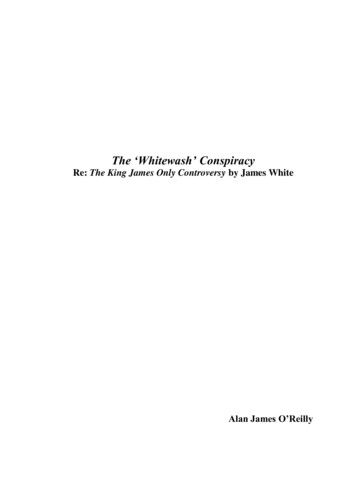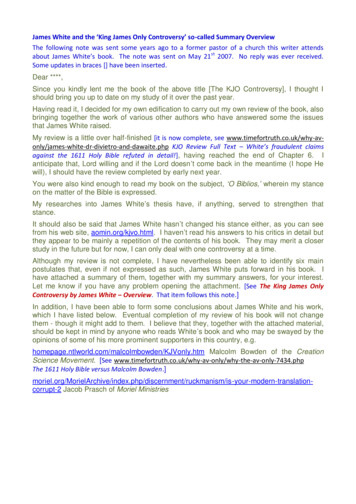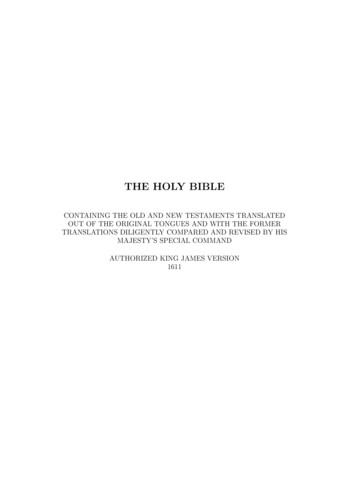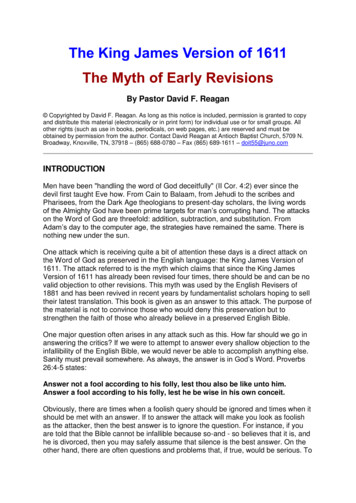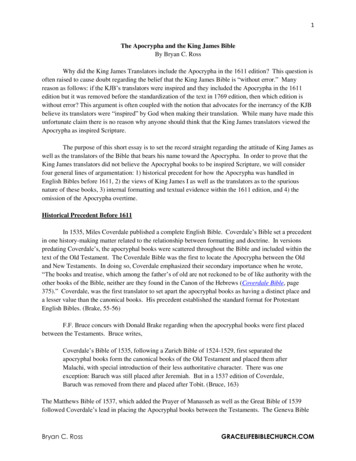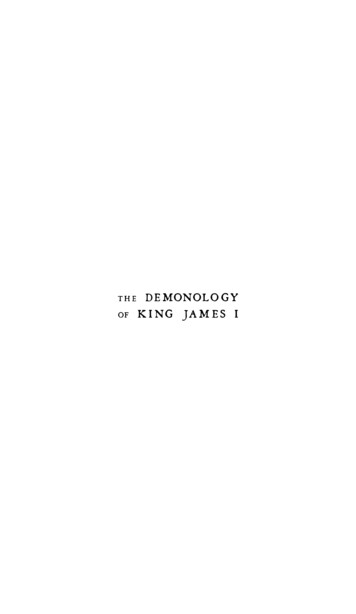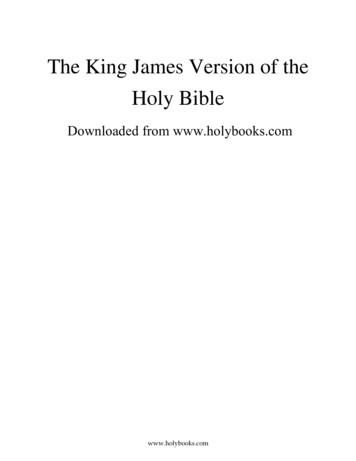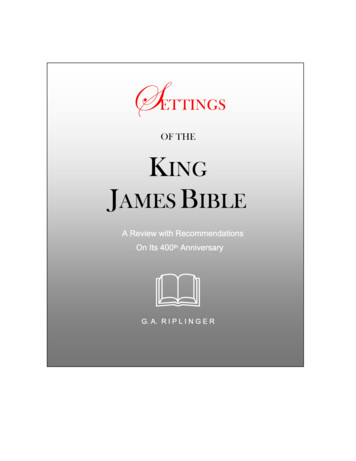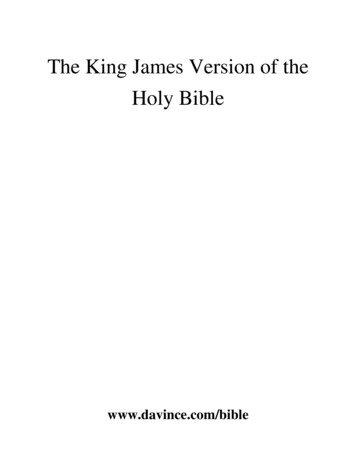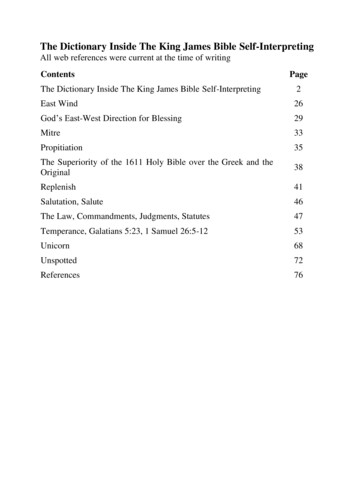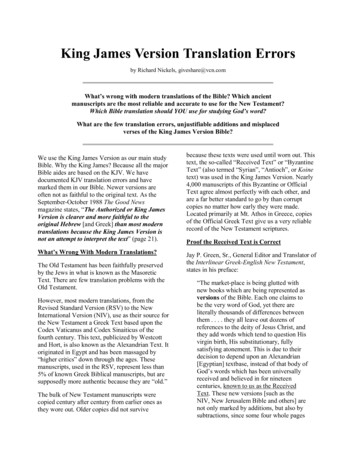
Transcription
King James Version Translation Errorsby Richard Nickels, giveshare@vcn.comWhat’s wrong with modern translations of the Bible? Which ancientmanuscripts are the most reliable and accurate to use for the New Testament?Which Bible translation should YOU use for studying God’s word?What are the few translation errors, unjustifiable additions and misplacedverses of the King James Version Bible?We use the King James Version as our main studyBible. Why the King James? Because all the majorBible aides are based on the KJV. We havedocumented KJV translation errors and havemarked them in our Bible. Newer versions areoften not as faithful to the original text. As theSeptember-October 1988 The Good Newsmagazine states, “The Authorized or King JamesVersion is clearer and more faithful to theoriginal Hebrew [and Greek] than most moderntranslations because the King James Version isnot an attempt to interpret the text” (page 21).because these texts were used until worn out. Thistext, the so-called “Received Text” or “ByzantineText” (also termed “Syrian”, “Antioch”, or Koinetext) was used in the King James Version. Nearly4,000 manuscripts of this Byzantine or OfficialText agree almost perfectly with each other, andare a far better standard to go by than corruptcopies no matter how early they were made.Located primarily at Mt. Athos in Greece, copiesof the Official Greek Text give us a very reliablerecord of the New Testament scriptures.What’s Wrong With Modern Translations?Jay P. Green, Sr., General Editor and Translator ofthe Interlinear Greek-English New Testament,states in his preface:The Old Testament has been faithfully preservedby the Jews in what is known as the MasoreticText. There are few translation problems with theOld Testament.However, most modern translations, from theRevised Standard Version (RSV) to the NewInternational Version (NIV), use as their source forthe New Testament a Greek Text based upon theCodex Vaticanus and Codex Sinaiticus of thefourth century. This text, publicized by Westcottand Hort, is also known as the Alexandrian Text. Itoriginated in Egypt and has been massaged by“higher critics” down through the ages. Thesemanuscripts, used in the RSV, represent less than5% of known Greek Biblical manuscripts, but aresupposedly more authentic because they are “old.”The bulk of New Testament manuscripts werecopied century after century from earlier ones asthey wore out. Older copies did not surviveProof the Received Text is Correct“The market-place is being glutted withnew books which are being represented asversions of the Bible. Each one claims tobe the very word of God, yet there areliterally thousands of differences betweenthem . . . . they all leave out dozens ofreferences to the deity of Jesus Christ, andthey add words which tend to question Hisvirgin birth, His substitutionary, fullysatisfying atonement. This is due to theirdecision to depend upon an Alexandrian[Egyptian] textbase, instead of that body ofGod’s words which has been universallyreceived and believed in for nineteencenturies, known to us as the ReceivedText. These new versions [such as theNIV, New Jerusalem Bible and others] arenot only marked by additions, but also bysubtractions, since some four whole pages
witnesses to the New Testament text. And95% of them witness to the Received Textreadings [contained in Green’s Interlinearand the King James Version]. Partly due tothe fact that ancient manuscriptscontaining the Received Text were wornout by use, while the Alexandrian textbasemanuscripts were preserved by the dryconditions of Egypt, some have sought todiscredit the Received Text because theysay it is not ancient. But now thatmanuscript portions from the secondcentury are being unearthed, it is foundthat many of the readings of the ReceivedText which had been tagged scornfully as‘late readings’ by nearly unanimousconsent of the ‘textual scientists’ areappearing in these [newly found]manuscripts. Readings which were beforecalled late and spurious have been foundin these early-date manuscripts . . . . Yetstrangely, in textual criticism classes, suchdiscoveries are swept under the rug, notreported to the class.”of words, phrases, sentences and verseshave been omitted by these new versions.And these are words attested to as God’swords by overwhelming evidencecontained in all the Greek manuscripts . . .“ . . . it has been written, ‘For I say toyou, Until the heavens and the earthpass away, in no way shall pass awayone iota or one point from the Law,until all things come to pass.’- -Matthew5:18 [Green’s paraphrased] . . . .“What then is the evidence these Biblealterers offer to persuade you to give upthe precious words they have removedfrom their versions? Mainly, they cite twomanuscripts, admittedly old, but alsoadmittedly carelessly executed. TheSinaiticus was so poorly executed thatseven different hands of ‘textual critics’can be discerned as they tried to imposetheir views on the Bible . . . it wasdiscarded, found in a wastebasket fourteencenturies after it was executed. TheVaticanus manuscript lay on a shelf in theVatican library at Rome until 1431, andwas considered so corrupt that no onewould use it . . . . they have systematicallyremoved Luke’s witness to the ascensionof Christ’and of course they have doneaway entirely with Mark’s witness to theascension, simply because these lasttwelve verses do not appear in those twocorrupt manuscripts, the Vaticanus andSinaiticus . . . .We use the King James Version exclusively as ourmain study Bible, only using other translations toaid study of certain passages, to get anotherperspective. The fact that modern versionsslavishly depend on the Egyptian and Vaticancorruptions of the New Testament should make usavoid them as a “main Bible.”Why Are There Errors in the King JamesVersion?You have probably heard the joke about thebigoted Protestant fundamentalist who said, “If theKing James Version was good enough for theapostles, it is good enough for me!” Peoplesometimes forget that the KJV was published in1611 A.D.“ . . . Origen, an early textual critic . . .said, that ‘the Scriptures are of little use tothose who understand them as they arewritten’ . . . . given the opportunity, manylike Origen will actually alter themanuscripts to make them say what theyunderstand them to mean.Justin Martyr,Valentinus, Clement of Alexandria,Marcion, Tatian, and a horde of otherspracticed their ‘textual science’ byoperating on manuscripts, or by writingtheir own ‘versions’ . . . .For centuries prior to 1611, Latin was the onlyscholarly language in Europe. The Latin Vulgatetranslation of Jerome, based upon a corruptAlexandrian Text, was the “official” text of thepowerful Roman Catholic Church.Protestant translators sometimes did not haveaccess to all of the Received Greek Official Text,and being familiar with the Vulgate, theysometimes put words into their translations based“ . . . Today there are more than 5,000manuscripts and lectionaries in Greek as2
upon the Latin which were never there in theoriginal Greek. Schaff points out that in about 80places in the New Testament, the KJV adopts Latinreadings not found in the Greek. Erasmus had acorrupt, incomplete text of Revelation to workfrom, and hence this book has many errors in theKJV.verse shows that since Israel rejected God’s laws,He allowed them to hurt themselves by followingfalse man made customs and laws.The King James translators did a marvelous jobwith the materials they had. While this article isnecessary to point out the KJV errors, it should benoted that the errors, omissions and additions madeby the RSV, NIV, and other modern translationsare much, much worse!Malachi 4:6 should read “ . . . lest I come andsmite the earth with utter destruction.” “Curse”doesn’t give the proper sense here. Same wordused in Zechariah 14:11.Daniel 8:14 is correct in the margin, whichsubstitutes “evening morning” for “days.” Too badWilliam Miller didn’t realize this.Matthew 5:48 should be “Become ye thereforeperfect” rather than “be ye therefore perfect.”“Perfect” here means “spiritually mature.”Sanctification is a process of overcoming with theaid of the Holy Spirit.Translation ErrorsHere is a partial listing of King James Versiontranslation errors:Matthew 24:22 needs an additional word to clarifythe meaning. It should say “there should no fleshbe saved alive.”Genesis 1:2 should read “And the earth becamewithout form . . . .” The word translated “was” ishayah, and denotes a condition different than aformer condition, as in Genesis 19:26.Matthew 27:49 omits text which was in theoriginal. Moffatt correctly adds it, while the RSVputs it in a footnote: “And another took a spear andpierced His side, and out came water and blood.”The Savior’s death came when a soldier piercedHis side, Revelation 1:7.Genesis 10:9 should read “ . . . Nimrod the mightyhunter in place of [in opposition to] the LORD.”The word “before” is incorrect and gives theconnotation that Nimrod was a good guy, which isfalse.Matthew 28:1, “In the end of the sabbath as itbegan to dawn toward the first day of the week . .” should be translated literally, “Now late onSabbath, as it was getting dusk toward the first dayof the week . . . .” The Sabbath does not end atdawn but at dusk.Leviticus 16:8, 10, 26 in the KJV is “scapegoat”which today has the connotation of someone whois unjustly blamed for other’s sins. The Hebrew isAzazel, which means “one removed or separated.”The Azazel goal represents Satan, who is noscapegoat. He is guilty of his part in our sins.Luke 2:14 should say, “Glory to God in thehighest, and on earth peace among men of God’sgood pleasure or choosing.” That is, there will bepeace on earth among men who have God’s goodwill in their hearts.Deuteronomy 24:1, “then let him” should be “andhe.” As the Savior explained in Matthew 19,Moses did not command divorcement. This statuteis regulating the permission of divorce because ofthe hardness of their hearts.Luke 14:26 has the unfortunate translation of theGreek word miseo, Strong’s #3404, as “hate”,when it should be rendered “love less bycomparison.” We are not to hate our parents andfamily!II Kings 2:23, should be “young men”, not “littlechildren.”Isaiah 65:17 should be “I am creating [am about tocreate] new heavens and new earth . . . .”John 1:31, 33 should say “baptize” or “baptizingIN water” not with water. Pouring or sprinklingwith water is not the scriptural method of baptism,but only thorough immersion in water.Ezekiel 20:25 should read “Wherefore I permittedthem, or gave them over to, [false] statutes that arenot good, and judgments whereby they should notlive.” God’s laws are good, perfect and right. This3
record in heaven, the Father, the Word, and theHoly Ghost: and these three are one. And there arethree that bear witness in earth, the Spirit, and thewater, and the blood: and these three agree in one.”The italicized text was added to the originalmanuscripts. Most modern translations agree thatthis was an uninspired addition to the LatinVulgate to support the unscriptural trinity doctrine.John 1:17 is another instance of a poorpreposition. “By” should be “through”: “For thelaw was given by [through] Moses . . . .” Mosesdid not proclaim his law, but God’s Law.John 13:2 should be “And during supper” (RSV)rather than “And supper being ended” (KJV).Acts 12:4 has the inaccurate word “Easter” whichshould be rendered “Passover.” The Greek word ispascha which is translated correctly as Passover inMatthew 26:2, etc.Revelation 14:4 should be “a firstfruits”, becausethe 144,000 are not all the firstfruits.Revelation 20:4-5 in the KJV is a little confusinguntil you realize that the sentence “This is the firstresurrection.” in verse five refers back to “theylived and reigned with Christ a thousand years” inverse four.I Corinthians 1:18 should be: “For the preachingof the cross is to them that are perishingfoolishness; but unto us which are being saved itis the power of God”, rather than “perish” and “aresaved.” Likewise, II Thessalonians 2:10 should be“are perishing” rather than “perish.”Revelation 20:10, “And the devil that deceivedthem was cast into the lake of fire and brimstone,where the beast and the false prophet are[correction: should be ‘were cast’ because thebeast and false prophet were mortal human beingswho were burned up in the lake of fire 1,000 yearsprevious to this time, Revelation 19:20], and shallbe tormented day and night for ever and ever.” Thepoint is that Satan will be cast into the same lakeof fire into which the beast and false prophet werecast a thousand years previously.I Corinthians 15:29 should be: “Else what shallthey do which are baptized for the hope of thedead, if the dead rise not at all? why are they thenbaptized for the hope of the dead?”II Corinthians 6:2 should be “a day of salvation”,instead of “the day of salvation.” This is a quotefrom Isaiah 49:8, which is correct. The day ofsalvation is not the same for each individual. Thefirstfruits have their day of salvation during thislife. The rest in the second resurrection.Revelation 22:2 should be “health” rather than“healing.”I Timothy 4:8 should say, “For bodily exerciseprofiteth for a little time: but godliness inprofitable unto all things . . . .”Italics: Sometimes Helpful, Sometimes WrongNo language can be translated word for word intoanother language. Hebrew and Greek idioms oftendo not come through clearly into literal English.Thus, beginning in 1560 with the Geneva Bible,translators initiated the practice of adding italicizedclarifying words to make the original languagemore plain. The fifty-four King James translatorsdid the same. Often, the added italicized words dohelp make the meaning clearer. At other times, thetranslators through their doctrinalmisunderstandings added errors instead.I Timothy 6:10 should be, “For the love of moneyis a [not the] root of all evil . . . .”Hebrews 4:8 should be “Joshua” rather than“Jesus”, although these two words are Hebrew andGreek equivalents.Hebrews 4:9 should read, “There remaineththerefore a keeping of a sabbath to the people ofGod.”Hebrews 9:28 is out of proper order in the KingJames. It should be: “So Christ was once offered tobear the sins of many; and unto them without sinthat look for him shall he appear the second timeunto salvation.”In Psalms 81:4, “was” is totally uncalled for andnot in the original Hebrew. New Moons are still astatute of God.We have shown how in Revelation 20:10 that theitalicized “are” is incorrect and that “were cast” initalics would have been more appropriate. AnotherI John 5:7-8 contains additional text which wasadded to the original. “For there are three that bear4
instance is John 8:28 where Jesus said (KJV), “Iam he.” The “he” is in italics and was not actuallyspoken by Jesus, completely obscuring the fact theJesus was claiming to be the great “I AM” of theOld Testament, John 8:58 and Exodus 3:14.future.Mark 16:9 does not say that Jesus was resurrectedSunday morning. There is a missing impliedcomma between “risen” and “early” and thereshould be no comma after week as the KJV has it:“Now when Jesus was risen early the first day ofthe week, he appeared first to Mary Magdalene . . .” Thus, it should say, “Now when Jesus was risen,early the first day of the week he appeared first toMary Magdalene . . . .”In Luke 3:23-38, the italicized words “the son” arenot in the original Greek. Actually, Luke gives thefleshly descent of the Savior through Mary, whileMatthew gives the legal descent through Joseph.Matthew 24:24 should not have the italicizedwords “it were”. It IS possible for the elect to bedeceived. We need to be on guard!Word DifferencesAnother thing to keep in mind is the fact that the1611 A.D. King James English is somewhatdifferent than today’s English language. Themeaning of certain words has changed, and/or theKing James sometimes uses words not familiar tomost people today in their common speech. Inaddition, certain idioms in the original Hebrew andGreek are a little difficult to understand today. TheOxford Wide Margin KJV has excellent marginalreferences which often explain the correctmeanings. Here is a partial listing of changed wordmeanings:Romans 1:7 incorrectly has the italicized words“to be.” The fact is, Christians are now saints.I Corinthians 7:19 needs some italicized words tomake the meaning clear. It should say:“Circumcision is nothing, and uncircumcision isnothing, but [the important thing is] the keepingof the commandments of God.”Colossians 2:16-17 can be properly understoodonly if the KJV italicized word “is” in verse 17 isleft out, as it should be. The message of theseverses is: don’t let men judge you as doingwrong when you observe the holy days, newmoons and sabbaths; let the body of Christ (theChurch) do the judging.King James Phrase (on top)Modern English (on bottom)Abraham’s bosomI Timothy 3:11 has “their” in italics, which is notimplied in the original.“the Kingdom of God” in which the redeemedwill have an intimate relationship with fatherAbraham in sharing the eternal inheritance ofthe earth.II Peter 2:5 should not have “person, a.” Noahwas the eighth preacher of righteousness.I John 2:23 has “[but] he that acknowledgeth theSon hath the Father also” in italics. This is anaddition based upon the Latin text and not in theoriginal Greek.adoptionPunctuation Problemsaffections“sonship”, as in Romans 8:23, 9:4, Ephesians1:5.“passions”, as in Galatians 5:24, “mind” as inColossians 3:2.Luke 23:43 has been erroneously used by some toclaim that Jesus went straight to heaven at Hisdeath. The original Greek did not have punctuationmarks as we do today. The KJV states, “And Jesussaid unto him, Verily I say unto thee, To day shaltthou be with me in paradise.” The comma shouldnot be after “thee”, but “day.” The believingmalefactor would be with Christ in the paradise ofthe redeemed when he was resurrected far into theafflict soul“fast” as in Leviticus 23:27, 32 (Psalms35:13).beguile5
“judge against you”, as in Colossians 2:18.Corinthians 5:17, Galatians 6:15.crossbetimes“stake”“early”, as in Proverbs 13:24.damnedblains“judged”, as in Mark 16:16.“blisters”, as in Exodus 9:9.devilsbosom, in his“demons”, as in I Timothy 4:1.“have an intimate relationship with”, as in IISamuel 12:3, 8, John 1:18.dissimulationbruit“hypocrisy”, as in Galatians 2:13.“report, rumor”, as in Jeremiah 10:22,Nahum 3:19.divers“different” places, persons or things as inMatthew 24:7 and Acts 19:9, Hebrews 1:1,James 1:2.charity“spiritual love”, as in I Corinthians 13.dividingclean heart“right attitude”, as in Psalms 51:10, 73:1.“expounding, dissecting”, as in II Timothy2:15.communicatedoting“share”, as in Hebrews 13:16.“sick”, as in I Timothy 6:4.communicationsdue benevolence“associations, companionships”, as in ICorinthians 15:33.“sexual dues”, as in I Corinthians 7:3.ensamplesconversation“examples, types”, as in I Corinthians 10:11.“conduct”, as in Philippians 2:27, I Peter 3:1,“citizenship” as in Philippians 3:20.faintconvince“give up” as in Luke 18:1, Galatians 6:9.“convict”, as in Titus 1:9, James 2:9.frowardcorn“evil, wrong”, as in Proverbs 2:12.“grain”, as in Leviticus 23:14, Deuteronomy23:25.gay“expensive, costly”, as in James 2:3.cover his feetGhost“go to the toilet”, as in I Samuel 24:3.“Holy Ghost” should be rendered “HolySpirit.”creature“creation”, as in Romans 8:20-21, II6
“lying”, as in Psalms 4:2, 5:6.glass“mirror”, as in I Corinthians 13:12, James1:23.letteth“restrains”, as in II Thessalonians 2:7.hardnesslusteth after“blindness” as in Mark 3:5.“earnestly desires” as in Deuteronomy 14:26.hemansionsIn reference to the Holy Spirit, the KJV usageof “he” rather than “it” implies the false notionof the trinity. The Holy Spirit is not a separateperson, but the mind of God the Father andGod the Son. See John 14:16, 17, 26 and16:7-8, 13-15.“offices” as in John 14:2.meat offering“meal offering”, as in Leviticus 23:13, etc.meetheart“fitting, proper”, Matthew 3:8, Genesis 2:18.“attitude of mind”, as in Jeremiah 17:9.mockedhell“deceived”, as in Galatians 6:7.There are three Greek words rendered “hell” inthe New Testament: gehenna, hades(equivalent of Hebrew sheol used in the OldTestament), and tartaroo. Gehenna is the lakeof fire, hades is the grave and tartaroo is theabyss, the place of restraint for Satan. ForEnglish speaking people during the time ofKing James, “hell” [hades] was a cellar to storepotatoes, not a lake of burning brimstone. InActs 2:27, “hell” is hades, meaning the grave,while in Matthew 10: 28 and Mark 9:43-48“hell” means the lake of fire. The only placetartaroo is used is in II Peter 2:4.morning stars“angels”, as in Job 38:7.nether“lower”, as in Deuteronomy 24:6.outlandish“foreign”, as in Nehemiah 13:26.perfect“spiritually mature”, as in II Timothy 3:17, or“upright or sincere” as in Genesis 17:1.husbandman“farmer, rancher”, as in James 5:7.performiniquity“finish”, as in Philippians 1:6.“lawlessness”, as in Matthew 24:12.him that “pisseth against the wall”jealous“males”, as in II Kings 9:8, etc.“zealous”, as in II Corinthians 11:2.press, theknew“the crowd”, as in Luke 19:3.“had sexual relations with”, as in Genesis 4:1.preventleasing“precede”, Psalms 88:13, I Thessalonians7
4:15.spiritual wickedness“wicked spirits”, as in Ephesians 6:12.prophesy“inspired preaching”, as in I Corinthians 14.sprinkle“astonish, startle”, as in Isaiah 52:15.quicken“make alive”, as in Romans 8:11.stranger“newcomer, new convert”, as in Deuteronomy14:29.quit“keep on”, as in I Corinthians 16:13.sufferrain“let, allow, permit” as in Mark 10:14,Revelation 11:9.“teach”, as in Hosea 10:12, Isaiah 2:3.rentesttarry“distort”, as in Jeremiah 4:30.“wait”, as in Luke 24:49, I Corinthians 16:8,which is explained in Acts 1:4.requitetempted“offer support for”, as in I Timothy 5:4.“tried or tested”, as in I Corinthians 10:13,James 1:13.rerewardrear guard” as in I Samuel 29:2.tenorrudiments“intent or purpose”, as in Exodus 34:27.“elements”, as in Colossians 2:8.tonguesthose who “seemed to be somewhat”“foreign languages”, Mark 16:17, ICorinthians 14.“boasters”, as in Galatians 2:6.virtueservant“power” as in Mark 5:30.“slave”, as in Philippians 2:7.visagesimple“appearance”, as in Isaiah 52:14.“harmless”, as in Romans 16:19.Unjustified Additions to the KJVDerived From Latin Vulgate, Not in Greek Textsincerity“with incorruption”, as in Ephesians 6:24.These additions should be omitted from the KJV:slept with his fathersMatthew 27:35“died”, as in II Kings 13:9, II Chronicles16:12.“that it might be fulfilled which was spoken bythe prophet, They parted my garments amongthem, and upon my vesture did they cast lots.”This verse appears properly in John 19:24.sons of God“angels”, as in Job 1:6.8
“or with a dart shot through”John 8:9-10Delete: “being convicted by their ownconscience . . . unto the last . . . alone . . . andsaw none but the woman . . . those thineaccusers.”I John 2:23“(but) he that acknowledgeth the Son hath theFather also” is placed in italics in the KJV.The Greek Text omits this portion entirely.The Greek properly reads: “But when theyheard it, they went away, one by one,beginning with the eldest, and Jesus was leftwith the woman being before him. Jesus liftedhimself up and said to her, ‘Woman, where arethey? Has no one condemned you?’“I John 5:7-8“in heaven, the Father, the Word, and the HolySpirit: and these thee are one. And there arethree that bear witness in earth” As previouslyexplained, this is not part of the original Greektext.Acts 9:5-6Revelation 1:8“it is hard for thee to kick against the pricks.And he trembling and astonished said, Lord,what wilt thou have me to do? And the Lordsaid unto him . . . .”“the beginning and the ending”Revelation 1:11Acts 10:6“I am Alpha and Omega, the first and the last:and . . . which are in Asia”“he shall tell thee what thou oughtest to do”Revelation 1:20Acts 10:21“which thou sawest”“which were sent unto him from Cornelius”Revelation 2:17Acts 21:8“to eat of”“that were of Paul’s company”Revelation 5:4Romans 13:9“and to read”“Thou shalt not bear false witness”Revelation 5:14Romans 16:20“four and twenty . . . him that lives forever andever”“Amen”Colossians 1:14Revelation 11:1“through his blood”“and the angel stood”Hebrews 2:7Revelation 12:12“and didst set him over the works of thyhands”“the inhabiters of”Revelation 14:5Hebrews 11:13“before the throne of God”“and were persuaded of them and embracedthem”Revelation 15:2Hebrews 12:20“over his mark”9
Acts 9:19Revelation 16:7“another out of”Should read, “Then was Saul certain days withthe disciples which were at the time inDamascus.”Revelation 16:14“of the earth and”Acts 20:28Revelation 21:3Should read, “ . . . the Holy Spirit has madeyou overseers, to feed the church of the Lordand God, which He purchased with His ownblood.”“and be their God”Misplaced Verses in the KJVPhilippians 3:3In Matthew 23:13-14, the proper order is: “Butwoe unto you, scribes and Pharisees, hypocrites!for ye devour widows’ houses, and for a pretensemake long prayer: therefore ye shall receive thegreater damnation. Woe unto you, scribes andPharisees, hypocrites! for ye shut up the kingdomof heaven against men: for ye neither go inyourselves, neither suffer ye them that are enteringto go in.”Should be “serve in (the) Spirit of God” ratherthan “serve God in the spirit.”Colossians 1:6Should have added “and is growing” after“bringeth forth fruits.”Colossians 2:13Romans 16:25-27 belongs after Romans 14:23,not at the end of the book.Should read, “And you’being dead in your sinsand the uncircumcision of your flesh’you hathHe quickened together with him, havingforgiven us all the trespasses . . . “Items Wrongly Substituted or Left Out of theKJV,Should be ReinstatedI Thess. 5:21Matthew 27:49Should read, “Despise not prophesyings, butprove all things . . . .”“And another took a spear and pierced his sideand out came water and blood.”II Timothy 2:19[The Orthodox Church says this was part ofthe Greek Text until mistakenly deleted in 511A.D.]“of (the) Lord” rather than “of Christ.”Hebrews 8:8Luke 9:50“To them”, not “with them.”“. . . for his is not against you.”Hebrews 13:9This verse should read: “And Jesus said tohim, Forbid him not, for he is not against you.For whoever is not against you is for you.”“Carried away”, not “carried about.”James 5:12Luke 10:22Should be “into hypocrisy” instead of “underjudgment.”“And having turned to the disciples, he said:”I Peter 2:2John 1:28End of verse should have added: “untosalvation.”“Bethany” instead of “Bethabara”, which wasa corrupt Egyptian reading.10
Should read, “ . . . ye holy saints and apostlesand prophets.”Revelation 2:21Should be “ . . . and she wills not to repent ofher fornication.”Revelation 19:12Should read, “ . . . and on his head were manycrowns, having names written, and a namewritten that no man knew . . . .”Revelation 6:12Should be “ . . . and the whole moon becameblood . . . .”Revelation 19:17Revelation 8:7Should read, “ . . . gather yourselves togetherunto the great supper of God . . . “, not“supper of the great God.”Should be “ . . . and the third part of the landwas burnt up, and the third part of the trees . . .”Revelation 21:24Revelation 8:13Should read, “And the nations shall walk bymeans of its light.”“eagle” rather than “angel.”Revelation 11:18Revelation 22:19“nations” instead of “dead.”Should read, “tree of life” instead of “book oflife.”Revelation 12:6Revelation 22:21Should read, “And the woman fled into thewilderness, where she has there a placeprepared of God . . . .”Should close with “The grace of the Lord JesusChrist be with all of the saints. Amen.”Revelation 13:5ConclusionShould read, “ . . . and power was given it tomake war forty-two months . . . .”The King James Version is a word-for-wordtranslation. Other translations, such as the NewInternational Version (NIV), are meaning-formeaning translations. As George Kackos rightlysaid in the July 1991 Plain Truth magazine, bothmethods have their strengths and weaknesses. Inusing a mixture of KJV and NIV in our familyBible Studies at home, we have been shocked atsome of the invalid interpretations of the NIV.Instead of being easier to read for our children, theNIV often is more difficult for children tounderstand than the King James. The multitude ofmodern translations have not captured the eleganceand beauty, nor the overall accuracy of the KingJames Version.Revelation 14:1Should read, “having His name and the nameof His Father written on their foreheads . . . .”Revelation 15:3“nations” instead of “saints.”Revelation 17:8Should read, “ . . . when they behold the beastthat was, and is not, and shall be present . . . .”Revelation 18:17C. S. Lewis sagely remarked, Odd the way theless the Bible is read, the more it is translated.In spite of its imperfections, the King JamesVersion remains a masterpiece. Believers shoulduse the KJV for their main study Bible, and othertranslations as secondary study aides.Should read, “ . . . everyone who sails to anyplace . . . “ instead of “and all the company inships.”Revelation 18:2011
This copy distributed by Shelter in the Word, PO Box 107, Perry, Michigan 48872-0107Tel: 517-625-7480 Fax: 517-625-7481 E-mail: Info@ShelterInTheWord.comI think this article would be better if it explained why the various scriptures were in error—but then it wouldbe much, much longer. I do not agree with everything in this article—in a few cases I think the King James is betterthan the correction given here. The most important point is to realize that no Bible translation, Bible translatoror Bible student can claim to have the perfect understanding of the Bible. So if we cannot do it all, why shouldwe bother to do any of it? Christ gave us an answer that is understandable in any translation:14 “Again, it will be like a man going on a journey, who called his servants andentrusted his property to them. 15 To one he gave five talents of money, to another twotalents, and to another one talent, each
Bible. Why the King James? Because all the major Bible aides are based on the KJV. We have documented KJV translation errors and have marked them in our Bible. Newer versions are often not as faithful to the original text. As the September-October 1988 The Good News magazine states, fiThe Authorized or
